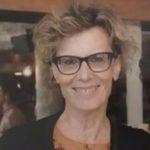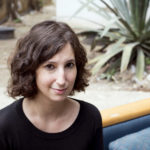One, Two, Three
Anat Zecharia
Translated from the Hebrew by Lisa Katz and Maayan Eitan
A. Behind the mountain*
1.
Fire burned at the earth’s center.
On the outside we were still awed, softhearted girls
eaten up by secrets.
The most beautiful thing in the world was the window
we climbed slowly like a mountain
and placed thoughts on the cornice.
We bothered to say hello
to everyone we found outside the window, and if
no one passed by we shouted:
Yosef, Olga, Bobby, Eitan, Ze’evi
and licked peanut butter from a forefinger.
The Brazilian cherry flowed over the living fence
with the force of nature.
If we misbehaved at home, someone stood
and embraced us early in the morning.
2.
Get up, get up we call, doubling and tripling,
believe us.
It’s not the time
to say what awakening means
it’s time to rise up from our lives
that lash us with a whip.
3.
We breathe oxygen and exhale carbon
the plants breathe carbon and exhale oxygen
God – she – moves above the waters**
where is our heart?
4.
Our parents created us for a particular purpose,
we disappointed them. They trusted us
like sand bags and the trenches of war
and we deserted. To the back of the mountains
one, two, three
behind the forest
one, two, three.
5.
One-two during lunch recess, one-two
during lunch recess. One-two the jump rope slaps during recess
if we stop we will see death in motion
without closing our eyes.
6.
We may return part of the way
to raise arms aloft
in circles:
the crescent rises
the hour eight
the screw at the edge of the shears
the pear-shaped hot bulb
humidity meter
bone buttons
your face
I wish my throat could stretch
7.
And why am I telling this story?
To return the fish to the water.
B. Behind the forest
1.
The sun’s distance from the earth is 150
million kilometers, if the sun were a little closer
we would burn and if farther away
we freeze. At the center of the sun it is 15
million degrees, at the perimeter 6,000.
If at the lip of the sun it were 15 million degrees
we here would all be ovens. Who placed it exactly
150 million kilometers away in order to allow us
to walk in the world,
to throw jars aloft, to grant our bodies to others and our souls
to silence?
2.
One stroke is enough,
nicely nicely, my finger slides
inside the mattress filled with soft, curled
Algerian seaweed
slips into other, sweeter waters.
This summer, this summer, this summer
there is no shortage, there’s everything
and no way back from the straw.
Now the body begins its journey, demanding gold.
In the colorful poisonous light of night
heavy wings made of light and flesh
flutter around our head.
A carob forest, a scout camp
tomorrow a mass of crowded eyes
will punch holes in both of us. But tonight
the cross is a precise connection
I shall always call: where art thou?***
3.
From now on be wary of people who are nice because of gold, because of great gold, of the sweet ones and the honeyed-lipped.
4.
Even if she returns tomorrow
I beg you not to drop me,
to gather me up into a blanket
into the thicket of flowers, between your legs
to the sweetness of the fruit.
I will lie down, bathe in the blanket
in whose folds the heart murmurs separately
droplets gather on the tongue
lacking an answer.
Summer fall winter
oh the forests
oh how far we’ve gone
how little I need to determine my horizon.
5.
On the gray ceiling
two white fans
on their backs.
Hanging angels, honored guests in the dark.
Each time a breeze passes through them,
their wings creak around the axis
spread the glory of destruction over my head.
If I obey the shade, the ceiling will vanish,
there is always a theft to speed, to electricity
or a hope for great things.
If I obey the shade, all will be lost
the great birds’ migration will begin
and someone-not me-will-say:
behold we are coming.
6.
Whoever returns each evening at sunset
to eat seasonal fruits
will easily point to a saucer
and a small vase with flowers.
In whoever sees angels a great hole gapes
for awe and disgrace
and two hands tied
and whoever believes
is always afraid
C. The three sat
They waited for the coin toss
in desirable bodies of water in cities like Rome or Paris
to which tourists hope to return
the three sat
disabled, emitting a muffled roar like a fog horn
passing in the night
the three sat
like downed pilots,
bubbles refusing to return to solid mercury
the three sat
the shadow of their hearts on the eastern wall,
what was given away and what was forsaken,
and a small boat called “canoe”.
If only all three’d been able to sit in it
their small hands would be in heart-shaped bowls
and not a vase
and the three sat
this is not the beginning of a poem
but a story
forgive us mother for we have sinned
D. One two three
“25 minutes to 6”, “20 minutes to 6”, “13 minutes to 6”
the second hand hovers above the numbers on the wing
When will all this end?
Stop counting
solemnity dries the dampness
and that which flashes and twists
kills sarcasm
if I gave names to things
most of them would be called by a word
in my dream
in which I became an orthodox woman
covering her head, turning into a swastika
which spins like a boomerang
and in my dream my breath
condenses on the cold glass
a tiny cloud, proof of the living body
and in my dream our skin kindles the oily night
if I told you then I loved you
ever since and to this day not
“each angel was horrible”
children stop time and long flights,
what shines from outside, crouching black
and the limp, soft touch in the middle of day,
and that which is warped by the radiant heat
and cold in the faucets
and to say of something that it is like something
over and out!
do you hear me?
Click HERE to read the Hebrew version of this work in Granta Hebrew.
Notes:
*The title and subtitle evoke an Israeli children’s song by Uzi Hitman in which three dwarfs sit chatting behind a mountain.
**A play on Genesis 1:2 which feminizes God by attributing a feminine verb to the action.
*** Genesis 3:9: “And the LORD God called unto Adam, and said unto him, Where art thou?” KJV
 Anat Zecharia is an award winning Israeli poet, dance critic, writer, and editor. Zecharia has been writing dance reviews for Yedioth Aharonot Newspaper since 2009. Her work has been awarded the Prime Minister’s Literary Award for writers. She has published three collections of poetry — As Soon as Beautiful (2008), Due to Human Error (2012), and Palestina I (2016). Her new manuscript “Ever After” won an ACUM (Israel’s music and literary rights association) literary award for 2019. Her work has been translated into over 10 languages, including Albanian, Swedish, Arabic and Chinese.
Anat Zecharia is an award winning Israeli poet, dance critic, writer, and editor. Zecharia has been writing dance reviews for Yedioth Aharonot Newspaper since 2009. Her work has been awarded the Prime Minister’s Literary Award for writers. She has published three collections of poetry — As Soon as Beautiful (2008), Due to Human Error (2012), and Palestina I (2016). Her new manuscript “Ever After” won an ACUM (Israel’s music and literary rights association) literary award for 2019. Her work has been translated into over 10 languages, including Albanian, Swedish, Arabic and Chinese.
 Lisa Katz was born in New York and has lived in Israel since 1983. She has a Ph. D from Hebrew University. Her translated books include Late Beauty by Tuvia Ruebner; Suddenly the Sight of War: Nationalism and Violence in Hebrew Poetry of the 1940s by Hannan Hever; Approaching You in English by Admiel Kosman; Look There by Agi Mishol. She is the Central English Editor for Poetry International Rotterdam.
Lisa Katz was born in New York and has lived in Israel since 1983. She has a Ph. D from Hebrew University. Her translated books include Late Beauty by Tuvia Ruebner; Suddenly the Sight of War: Nationalism and Violence in Hebrew Poetry of the 1940s by Hannan Hever; Approaching You in English by Admiel Kosman; Look There by Agi Mishol. She is the Central English Editor for Poetry International Rotterdam.
 Maayan Eitan (1986) grew up in Jerusalem, the Negev and Tel Aviv. She holds a master’s degree in comparative literature from the University of Michigan. Her short stories and translations appeared in Israeli and international journals, including Granta Online, Granta Hebrew Online, World Literature Today and Odot. Her debut novel will be published in 2019 in Israel.
Maayan Eitan (1986) grew up in Jerusalem, the Negev and Tel Aviv. She holds a master’s degree in comparative literature from the University of Michigan. Her short stories and translations appeared in Israeli and international journals, including Granta Online, Granta Hebrew Online, World Literature Today and Odot. Her debut novel will be published in 2019 in Israel.
